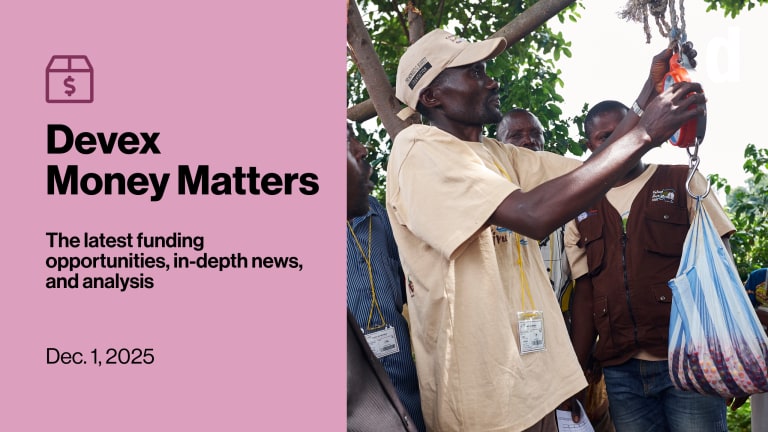Since my arrival here in Zambia, I have uncovered a perverse payment system that undermines development and fuels what amounts to corruption. This system of institutionalised expropriation was created by donors.
The system is very simple. Here at the Lundazi District Council, you get paid between 50,000 kwacha (US$10) and 150,000 kwacha ($30) for attending an external meeting, depending on your seniority. Just being outside the office gets you 50,000 kwacha - five times the average daily salary. This is sometimes paid for meetings lasting less than an hour.
The first time I experienced this was during my first month in Zambia, when I attended a training seminar held for the councilors in Lundazi. At the end of the three days, I could see people signing a piece of paper and then being handed a bunch of money. I was intrigued but, being new to the council, did not want to question things I did not yet understand.
The administrator noticed my quizzical looks and when he had completed the queue, dashed over and put 300,000 kwacha ($60) in front of me.
"What is that for?" I asked innocently.
He looked at me with a huge grin.
"Corruption," he said before letting out a huge laugh and slapping me on the back.
I looked around, shocked and worried that others might have overheard us. I needn't have been worried: Others joined the administrator's laughter, chuckling "corruption" to themselves and shaking their heads. Later I asked a colleague what the money was for and he said that the money was for out-of-pocket expenses I might have lost during the training. I explained that I had eaten and stayed at home so my expenses were zero and he laughed and told me I was free to burn the money if I wanted.
I have heard that allowances were part of a U.N. system that wanted to cut down on salaries. If you were leaving your work, your employer should be compensated for losing your productive talents, the theory went, I've been told. As a result, your employer would lower your salary but pay for "expenses."
Somewhere in the ivory tower where the development policy is designed this must have seemed like an inspired idea. But it seems to me that it has fueled a rotten system of quasi-corruption where decisions about what work to do depend not on the impact the work will have but on how many meetings you can hold or attend, or what meeting will give you the bigger allowance.
The effect is pervasive. Firstly, people hold more meetings than they need to, which means there is no one around to follow up on decisions that have been made. Secondly, often the wrong people attend meetings. This is either because they are relatives or friends of the individual who has called the meeting, or a senior staff member who is attending for the allowance instead of delegating to a more appropriate but junior colleague. When the wrong people attend, they cannot contribute to the discussion and will not benefit from the training in their jobs. They are often disinterested and spend most of the meeting talking outside on their mobile phones.
It also adds to the ridiculous competition for knowledge, by creating a disincentive to sharing information. Here, information means you get to attend workshops, and workshops mean money. So information is not shared, it is guarded like personal property. Even if a colleague manages to glean some information from a workshop, and even if it is not relevant to her work, she may not pass it on to a relevant colleague as this might mean that the colleague will be invited next time.
And you cannot attend a meeting just because you believe it will be useful for your job: Attendance is limited by an organization's budget. Protocol dictates that you must be invited or that a senior colleague nominates you.
This all creates a secondary effect: If you request to go to a meeting, everyone is suspicious about your motivations. Rather than assuming you would like to talk about an important issue, colleagues often believe you are just interested in the allowance. This means genuine requests that hold the opportunity for beneficial dialogue and development will sometimes be turned down, particularly if the budget holder (normally the head of an organization) is planning to hold a well-rewarded meeting for his cronies with the same money.
Having their meeting requests rejected, and seeing cronies attend well-rewarded meetings that not directly related to their work demotivates staff.
One colleague told me this: "When I see all these guys attending this meeting, I just think why should I bother doing any work? In every other council in Zambia, my position is represented [at such a meeting], but not here for some reason."
When dozens of people, all with interesting job titles, attend a meeting, it becomes practically impossible to know if they were genuinely needed to be there. It is also very difficult to spot the inevitable reciprocation that will go on - you ask me to your meeting and I will ask you to mine.
Organizations need to be constantly challenged to improve and move forward. But this payment system incentivizes attendees to agree with whoever is holding a meeting, since they want to ensure that they will be invited back. Serious and open discussion is stifled. Meetings are full of silent attendees and at worse, enthusiastic endorsers of any proposal coming from the meeting's organizer. Passivity, in this case, gets you places.
The system is clearly being worked here in Zambia, and from conversations with my Malawian and Ethiopian colleagues it is standard practice there too. This stems in part from the very low salaries paid to government workers and community volunteers. Surely, a better system would be to pay them to do their jobs well.
The final nail in the coffin is that almost no other system of staff appraisal exists. People do not work to targets or have their performance monitored. A sign of hard work is the number of meetings you attend. No one wants to speak up against it, as many believe they benefit from the status quo. If those who are now left out get invited to an external meeting one day, they will most likely go no matter what, as it is now considered an acceptable part of Zambian "culture."
This system appears to drive inappropriate behaviour and reward it handsomely. It fails to encourage the critical dynamism that is essential for any organisation or country to develop. It may be a huge waste of money, too, although its effects on work effectiveness and efficiency are hard to gage. Still, in my mind, it is difficult to think of a worse payment strategy, and I challenge you to find something positive to say about it.
Perhaps those in the ivory tower should consider whether a meeting that occurred here recently - ironically, to increase the transparency of procurement - provided good value for the money spent: Fifteen people attended, each got $30 for 15 minutes "work." If similar meetings happen once a week, in all 80 councils in Zambia, total annual cost could approach $1.8 million.
Nice work… if you can get it.








